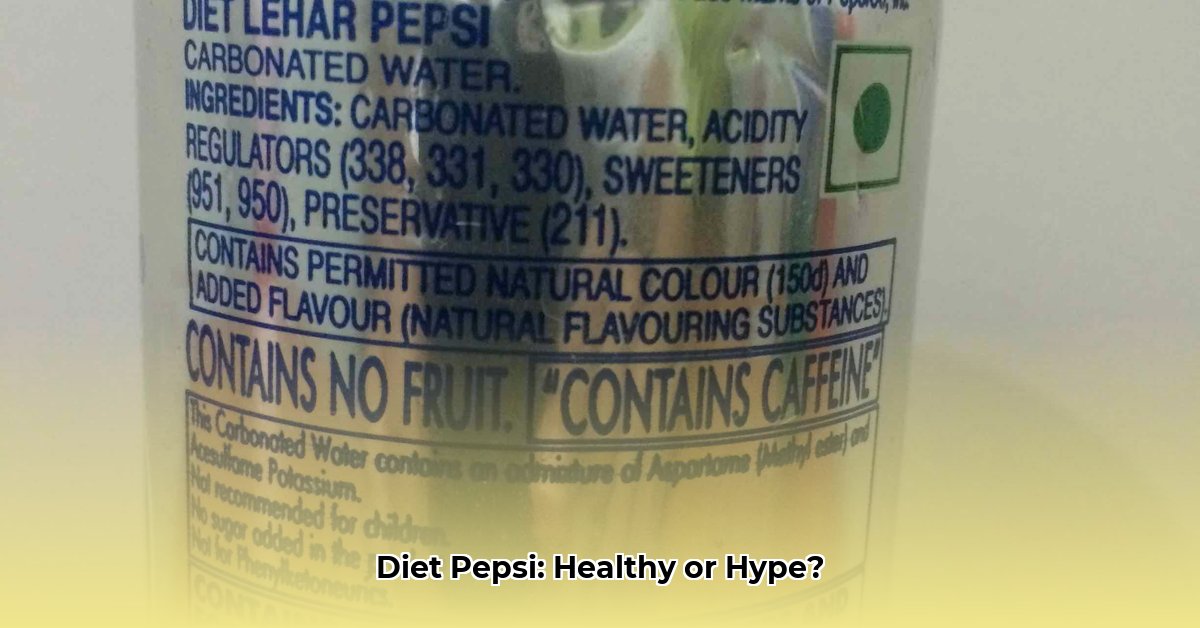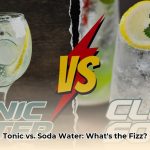What’s Really in Diet Pepsi?
This guide provides a comprehensive look at the ingredients in Diet Pepsi, exploring what each component is, its purpose, and potential health implications. We’ll examine the science behind the ingredients, address common concerns, and offer a balanced perspective to help you make informed choices about your beverage consumption.
Decoding the Diet Pepsi Formula
Carbonated Water: The Essence of Fizz
The base of Diet Pepsi, like most sodas, is carbonated water. This is simply water infused with carbon dioxide gas, creating the signature bubbly effervescence. This ingredient is generally considered harmless.
Caramel Color: Coloring the Cola
Caramel color lends Diet Pepsi its characteristic brown hue. However, a byproduct called 4-MEI (4-methylimidazole) is formed during caramel color production. While regulatory agencies generally deem the levels in Diet Pepsi safe, some studies suggest potential health concerns with higher levels of 4-MEI. More research may clarify these concerns.
Artificial Sweeteners: A Sweet Substitute?
Diet Pepsi uses a blend of artificial sweeteners to achieve sweetness without the calories of sugar:
- Aspartame: Approximately 200 times sweeter than sugar, aspartame allows for a sweet taste with minimal calories. While generally considered safe, some individuals report headaches or dizziness after consumption. Individuals with phenylketonuria (PKU) must avoid aspartame due to its phenylalanine content. Ongoing research continues to explore potential long-term effects.
- Acesulfame Potassium (Ace-K): Often combined with aspartame to enhance sweetness and extend shelf life, Ace-K is another calorie-free sweetener. While approved by regulatory agencies, some questions remain about its long-term health impacts.
Preservatives: Maintaining Freshness
Two primary preservatives help maintain Diet Pepsi’s shelf life:
- Phosphoric Acid: This ingredient provides a tangy flavor and inhibits microbial growth. However, some research suggests excessive consumption may negatively affect bone health and tooth enamel over time.
- Potassium Benzoate: This preservative also helps prevent spoilage. While generally regarded as safe, it can react with vitamin C under specific conditions to form benzene, a known carcinogen, though typically at levels considered safe by regulatory agencies.
Other Additives: Enhancing Flavor and Stability
- Caffeine: This stimulant provides Diet Pepsi’s characteristic energy boost. While moderate caffeine intake is generally safe, excessive consumption can lead to anxiety, insomnia, and other side effects.
- Citric Acid: This ingredient adds a citrusy flavor and acts as a preservative. Like phosphoric acid, excessive consumption of acidic beverages like Diet Pepsi may contribute to tooth enamel erosion.
- Sodium Citrate: This compound helps regulate acidity and balance the overall flavor profile. It is generally considered safe.
- Natural Flavors: These enhance the taste, but their specific composition is often undisclosed, leading to a lack of transparency for consumers.
Is Diet Pepsi Safe? A Balanced Perspective
Addressing Common Concerns
- Cancer Risk: Currently, no credible scientific evidence directly links Diet Pepsi consumption to cancer.
- Weight Gain: While some studies suggest a correlation between artificial sweeteners and weight gain, more research is needed to understand the underlying mechanisms. Weight gain is multifactorial, influenced by overall calorie intake, physical activity, and other lifestyle factors.
Diet Pepsi vs. Pepsi Zero Sugar: A Sweetener Swap
The primary difference lies in the sweeteners. Diet Pepsi uses aspartame and Ace-K, while Pepsi Zero Sugar uses aspartame and sucralose. This results in slightly different tastes and sweetness profiles.
Regional Variations: Ingredient Lists May Vary
The specific formulation of Diet Pepsi, including ingredients and their amounts, can vary by region. Always check the product label for the most accurate information.
Artificial Sweeteners: Pros and Cons
Benefits of Artificial Sweeteners in Diet Pepsi
- Weight Management: Substituting sugary drinks with diet versions like Diet Pepsi may assist in weight management when combined with a healthy diet and exercise. The minimal calorie content of artificial sweeteners can contribute to reduced overall calorie intake.
- Blood Sugar Control: Unlike sugar, artificial sweeteners do not cause a rapid spike in blood glucose, making them potentially suitable for individuals with diabetes or those monitoring their blood sugar levels.
Potential Drawbacks of Artificial Sweeteners in Diet Pepsi
- Health Concerns: Some individuals report headaches or dizziness after consuming aspartame. Ongoing research continues to investigate potential long-term health effects.
- Metabolic Effects: Emerging research suggests a possible link between artificial sweeteners and changes in gut bacteria and glucose metabolism. Further research is necessary to understand the long-term implications.
Considering Overall Acidity: Dental Health
Diet Pepsi’s acidity, similar to other carbonated drinks, can erode tooth enamel over time. Regular dental check-ups and good oral hygiene practices can help mitigate this risk.
Phosphoric Acid: A Deeper Dive
Phosphorus: Essential Nutrient, Potential Hazard
Phosphoric acid contributes to Diet Pepsi’s tangy taste and acts as a preservative. Phosphorus itself is an essential mineral, vital for healthy bones, teeth, and DNA. However, excessive consumption from added sources like phosphoric acid is a concern.
Potential Impacts of Excess Phosphoric Acid
- Tooth Enamel Erosion: Phosphoric acid can weaken tooth enamel, increasing susceptibility to cavities and decay.
- Bone Health: It can interfere with calcium absorption, potentially affecting bone density over time.
- Kidney Strain: Excessive phosphorus intake can burden individuals with chronic kidney disease.
- Mineral Absorption: Phosphoric acid may hinder the absorption of other essential minerals like iron, zinc, and magnesium.
- Cardiovascular Health: Some research suggests a possible link between high phosphorus intake and cardiovascular issues, but more research is needed.
Moderation is Key
While a single can of Diet Pepsi contains a relatively small amount of phosphoric acid (around 50-60mg), regular consumption, coupled with other dietary sources of phosphates, can lead to excessive intake.
Healthier Alternatives
Consider these alternatives to diet soda:
- Water: The ultimate hydration source, water is calorie-free and readily available.
- Unsweetened Tea: Offers flavor and antioxidants without added sugars or artificial sweeteners.
- Fruit-Infused Water: Combines the hydration of water with the natural sweetness and flavor of fruits and vegetables.
Making Informed Choices
This guide aims to empower you with the knowledge to make informed decisions about your beverage consumption. It’s crucial to stay updated on the latest research and consult with a healthcare professional or registered dietitian for personalized advice based on your individual needs and circumstances.
| Ingredient | Function | Potential Concerns |
|---|---|---|
| Carbonated Water | Base | None |
| Aspartame | Sweetener | PKU concern, potential headaches/dizziness, ongoing research on long-term effects |
| Acesulfame Potassium (Ace-K) | Sweetener | Ongoing research on long-term effects |
| Caramel Color | Coloring | 4-MEI byproduct (generally considered safe at current levels) |
| Phosphoric Acid | Tartness, Preservative | Potential impact on bone health and tooth enamel with excessive intake |
| Caffeine | Stimulant | Overconsumption can cause side effects (jitteriness, sleep disruption, etc.) |
| Potassium Benzoate | Preservative | Potential for benzene formation in specific circumstances (generally considered safe at current levels) |
| Citric Acid | Flavor enhancer, Preservative | Generally safe, potential for tooth enamel erosion with excessive intake |
| Sodium Citrate | Acidity regulator | Generally safe |
| Natural Flavors | Flavor enhancer | Lack of transparency about specific composition |
This information is for educational purposes and should not be considered medical advice. Always consult with a healthcare professional for any health concerns.
- Recommended Meditation Books for Beginners and Experienced Practitioners - February 3, 2026
- Great Mindfulness Books to Guide Your Journey to Inner Peace - February 2, 2026
- Good Books on Meditation to Start or Deepen Your Practice - February 1, 2026
















